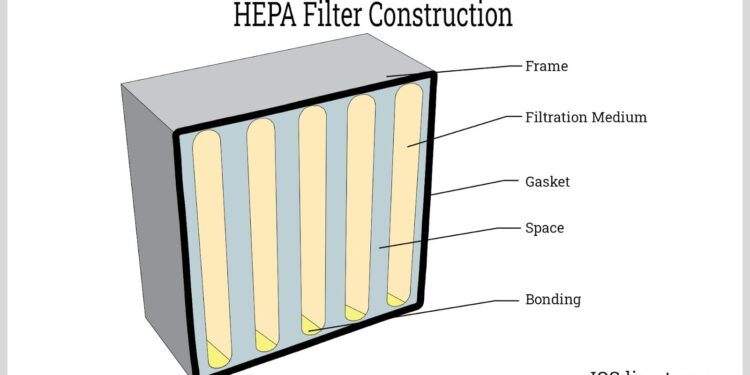A Fresh Look at Air Quality: Why HEPA Filters Matter

Table of Contents
- 1 Key Takeaways
- 2 Breathing Easy: The Fundamental Role of HEPA Filters
- 3 Filter Maintenance: The Key to Longevity
- 4 Benefits for Allergy Sufferers
- 5 Understanding Particulate Matter and Its Impact on Health
- 6 Choosing the Right Air Purifier: What to Consider
- 7 HEPA Filters in Various Environments
- 8 Future Trends: Innovations in Air Filtration
- 9 How to Make the Most of Your HEPA Filters
Key Takeaways
- HEPA filters are crucial in improving indoor air quality by trapping harmful particles.
- Regular maintenance and replacement of filters can improve their efficacy.
- Utilizing HEPA filters benefits individuals with allergies and respiratory conditions.
- Air quality can be systematically improved through informed filter choices and proper usage.

Breathing Easy: The Fundamental Role of HEPA Filters
In today’s industrializing world, maintaining good air quality is crucial. HEPA (High-Efficiency Particulate Air) filters are an effective way to improve indoor air quality. They capture particles as small as 0.3 microns, including dust and allergens. These filters can trap 99.97% of airborne particles, promoting healthier air in homes and workplaces.
However, when integrating these filters into your living space, it is crucial to consider how long do HEPA filters last. This question isn’t just about longevity but about understanding the efficiency and timing of replacements to maintain the high air-quality standards they promise. In regions where air pollution is a growing health concern, adopting HEPA filters can dramatically influence the atmosphere inside homes, shielding inhabitants from invisible airborne threats.
Filter Maintenance: The Key to Longevity
Maintaining HEPA filters is crucial for optimal performance. Regular inspections are required since their lifespan varies from 6 to 12 months, depending on air quality and usage frequency. High airborne particles or heavy usage require more frequent replacements. A clogged filter can harm air quality, increase energy bills, and strain the purifier, potentially shortening its lifespan. Routine checks and timely replacements are essential for air quality and device longevity.
Benefits for Allergy Sufferers
Allergy sufferers might find comfort with HEPA filters, which catch allergens like dust, pollen, and pet hair. Many report fewer allergic reactions and improved comfort, especially during peak seasons. HEPA filters restrict exposure to dangerous particles, resulting in fewer medical visits and decreased reliance on medicine for respiratory ailments. Cleaner air helps sensitive systems function better, enhancing overall well-being.
Understanding Particulate Matter and Its Impact on Health
Particulate matter is a key air pollutant that poses serious health risks. It consists of tiny particles from sources like vehicle emissions and factory smoke. PM2.5 particles are especially harmful since they may be inhaled and enter the bloodstream, causing health issues like heart disease and lung cancer. The EPA guide emphasizes the need to reduce exposure to these particles and suggests using HEPA filters as an effective way to protect health.

Choosing the Right Air Purifier: What to Consider
When choosing an air purifier with a HEPA filter, remember your room size to provide enough coverage. Noise levels are important, especially in bedrooms or offices where quiet is preferred. Energy efficiency is also important since it helps preserve air quality while lowering power prices. Look for features like air quality sensors and smart controls. Consulting reliable resources like the Consumer Reports guide can provide detailed reviews and comparisons to help you make an informed decision.
HEPA Filters in Various Environments
HEPA filters are vital in various settings beyond homes. In hospitals, they help maintain sterile conditions and reduce airborne infection risks in areas like operating rooms. Schools use HEPA filters to protect the health of children and staff by ensuring low levels of airborne pollutants. Additionally, industrial environments, such as clean rooms in electronics and pharmaceuticals, rely on HEPA filtration to meet strict air quality standards. This versatility highlights the effectiveness of HEPA technology across different sectors.
Future Trends: Innovations in Air Filtration
The air filtration landscape is experiencing significant innovations, particularly smart filters and integrated air quality monitoring systems. These advanced technologies provide real-time data on indoor air quality and notify users when to replace filters, simplifying maintenance. As these systems evolve, they will become more personalized, efficient, and eco-friendly, contributing positively to public health.
How to Make the Most of Your HEPA Filters
To maximize HEPA filter efficacy, ensure proper installation with a sealed frame to prevent unfiltered air. Handle filters gently when cleaning or replacing them to avoid damaging their fibers. Operate air purifiers intermittently in already purified areas to extend filter life and reduce energy waste, preserving the appliance’s performance.







